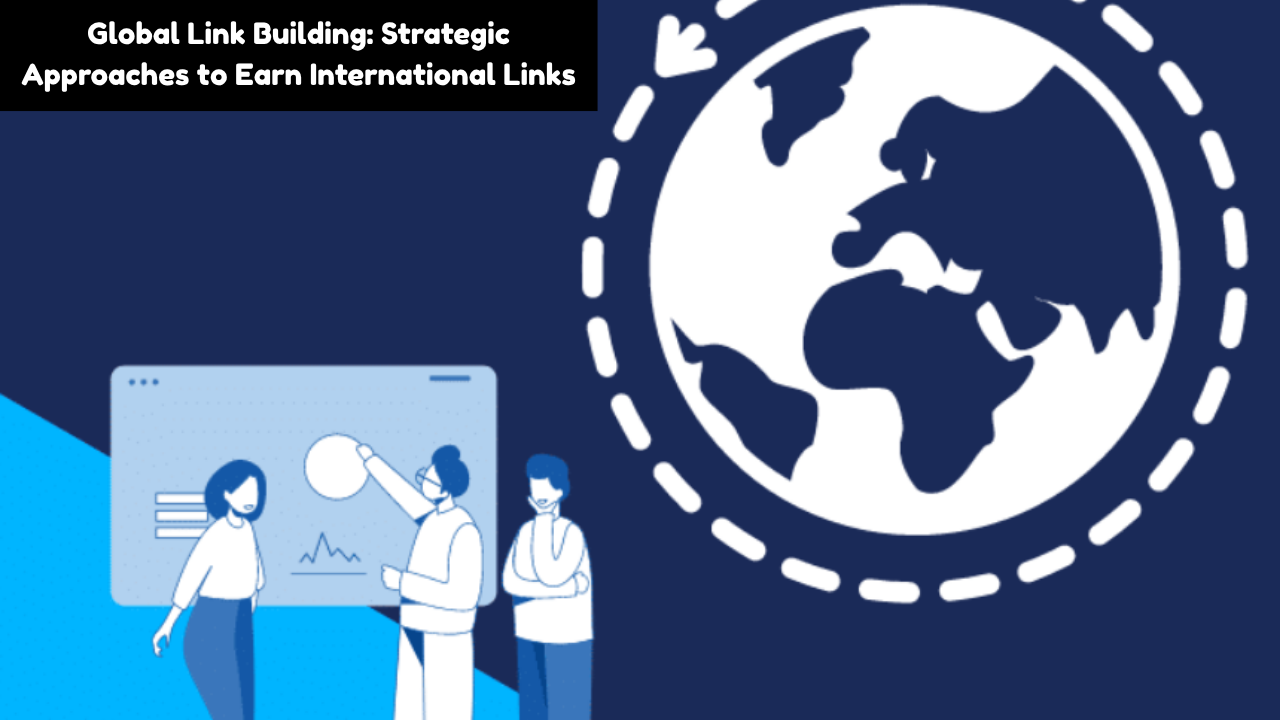The more the digital world connects, the more businesses need to think outside the box for their local audience if they want to remain competitive. Trying to go to the online market worldwide is sheer necessity for long-term growth. Global link building is an efficient strategy to achieve this, visa-vis obtaining backlinks from reputed sites in foreign countries.
This also makes search results more visible internationally and gives increased authority for varied regions. This article is, therefore, set to unpack what global link building is, why it is relevant in the international SEO domain, and how you can capitalize on it to market to different audiences.
What Is Global Link Building and Why Does It Matter?
Global link building refers to acquiring backlinks from websites based in other countries. These links get your website recognized in international markets and concern search engines in multi-regions. Thus, if credible sites outside your country link to your website, it’s an important sign for Google that your content is useful beyond the local economy.
Search engines view backlinks as indicators of trustworthiness and authority. If your site rarely earns links from a country, it might have difficulty acquiring traffic in foreign regions. But if links keep coming in from different countries and languages, it certainly builds a firm’s possibility in foreign search results, driving traffic, and becoming their spending presence.
Key Benefits of International Backlinks
International backlinks have benefits exceeding SEO implications that contribute to the global reach of a website in diverse manners. What kind of difference can they create?
1. Better Search Engine Rankings in Target Countries
Another thing that can greatly multiply your SEO gains is backlinks from different countries. Search engines begin to identify relevancy with regards to those specific cities when backlinks come from country-specific domains like .uk, .fr, or .de. Ranking higher in local searches would help connect with more target audience members on the partner side.
2. Stronger Domain Authority via Global Sources
Having backlinks from legitimate sites across countries adds diverse and authoritative signals to your domain. Diverse though it may be, it indicates to Google that your site is relied upon globally, helping in beefing up an overall domain rating stronger.
3. Increased Brand Exposure to International Audiences
If your sites have mentions on international blogs, directories, or media websites, your brand gets to be known from all over. This way, you create awareness for new regions without spending tons of money on advertisements.
4. Boosted Trust with Culturally Relevant Content
Hence, backlinks from locations usually share a context and language that suit a target audience. When international users see your website recommended on a platform they trust, it gives instant credibility and entices them to interact with your content.
5. Enhanced Referral Traffic from Diverse Regions
Each backlink acts like another pathway that users may use to get to your site. When links are put on global platforms, you begin gathering world-class visitors from all around the globe and thereby making yourself wider-known and having more leads.
Types of International Backlinks
The importance of international backlinks does not solely lie in their quantification, but rather in their relevance, authority, and strategic placement on various global platforms. We will now outline the types of international backlinks that will empower your international SEO :
1. Local Country TLD Websites (.de, .fr, .in, etc.)
Country-code top-level domain (ccTLD)-based websites, such as .de for Germany, .fr for France, or .in for India, constitute a very strong geo-signal to search engines. Backlinks from country-specific domains (ccTLDs) can improve a site’s visibility in that particular region. For instance, if you want to target the German user base, a backlink from a .de domain has more regional SEO weight than a generic .com link.
2. Country-Specific Business Directories
As YELP and GMB listings help local SEO, country-specific directories help international SEO. They could be niche directories, government-approved listings, or industry specific in a given country. Not only do these links carry authority, but they boost brand visibility locally and can actually pass referral traffic from real users.
3. Global Guest Posting Opportunities
Contributing quality content to international blogs or media sites is a best source of high-quality backlinks. Guest posts typically have author bios and contextual links that point back to your website. Content that you pitch should be suited to the regional language, and interests of the audience. For example, a legal blog post written for a UK audience should be based on UK laws and cultural context.
4. Multilingual News Mentions
Being featured in global news publications and notably those offering a multilingual edition is a good way of gaining international authority. Such backlinks are typically offered through press releases, being cited as an expert, or working with journalists. Being cited in international media outlets gives you an SEO boost and makes sure that new audiences will trust and rely on you.
5. Regional Forums and Online Communities

Participating in local forums or platforms like Quora India, Reddit Germany, or a niche-specific message board can also help gain backlinks. Though some may be nofollow backlinks, some pass link juice anyway by driving traffic and especially increasing brand exposure. The key is to engage authentically, offer true value, and somehow very discretely reference some relevant content from your own site.
Proven Tactics for Global Link Building Success
Building a network of strong international backlinks is indeed a must if you want your site to rank globally. Here are some proven ways to get high-quality links worldwide:
1. Translate & Localize High-Performing Content
Find the content on your site that is performing well, whether it is blog posts, guides, or case studies, and translate and localize it for the target areas. But don’t just translate-it should be adapted with cultural references, legal requirements, currencies, and local examples. Search engines favor pages that are localized and are more likely to be linked to by local publishers and bloggers.
2. Collaborate with Foreign Bloggers and Webmasters

Now get on with reaching bloggers, influencers, and owners of websites in your niche in the countries you are targeting. Propose to exchange guest posts, co-author contents, or offer expert quotes. Personalize your pitch by pointing towards their local context or specific needs of their audience. Just a guest post on the well-respected foreign blog can do a lot of good for both visibility and domain authority.
3. Join Global Industry Events and Digital PR Campaigns

Entering into international conferences, expos, or virtual summits will help you network with the media, bloggers, and niche authorities. Use it to unleash the updates or achievements worthy of news, then send digital press releases to local news agencies. Such global-level PR campaigns often end up getting you backlinks from powerful international domains.
4. Submit to International Business Directories
Your listings will greatly benefit search engines in recognizing your location in those target countries through the avenue of claiming your profile in renowned business directories. Top-tier platforms for your industry to consider are Clutch, Hotfrog, or the chamber of commerce for the country; make sure your NAP (Name, Address, Phone) info has been standardized. Such citations can also grant local search ranking chances.
5. Use HARO-Style Platforms in Other Countries
Other countries have HARO-like (Help A Reporter Out) platforms at their disposal. Journalisten Anfragen (JA) in Germany, SourceBottle in Australia, and ResponseSource are examples for the UK. These let you provide expert insights to foreign journalists. Should your information be cited, you generally snag a backlink from media publications in that region.
Common Challenges in Global Link Building
ExAn international backlinking approach will greatly enhance SEO benefits but comes with some challenges of its own. Listed below are some of the most common issues you could come across:
- Language Barriers and Cultural Cues
If conducted in non-native languages, these may obstruct communication with webmasters or publishers. If not localized or relevant to the local culture, the content may get taken as offensive.
- Relevancy and Quality Control
Not every international site is going to be a good fit. Getting links from unrelated or low-caliber websites can actually do your SEO harm. Check the authority of the site and whether it fits into your topical category before you try to get a backlink there.
- Time Zone Differences and Communication Styles
Having business contacts, bloggers, and site owners from the other side of the globe in many time zones causes delays and makes the turn-around time for responses longer, therefore making the outreach campaigns more time-consuming.
- Presence of Low-Authority Sites in International Markets
Some international sites could be really poor options when it comes to moderation or SEO standards. Without proper scrutiny, you may end up obtaining backlinks from domains that are deemed spammy or unrelated, which could negatively impact your SEO.
Tools to Support International Link Outreach
With the right tools, backlinking across borders becomes that much easier. These platforms can make your global outreach more streamlined, target more effectively, and ensure smooth communication among stakeholders:
- Ahrefs / Semrush
These tools help you analyse international backlink profiles of competitors and identify top referring domains by country, besides tracking your own global link-building activities. The results can also be filtered by country TLDs and languages.
- Hunter.io / Snov.io
The two refer to email outreach tools used to find contact info for owners of websites, journalists, and bloggers located in various regions. They also have campaign automation to make it easier to conduct outreach in different languages.
- Google Translate / DeepL
It is very important that your outreach is multilingual. These tools will translate your emails, website copy, and pitches faithfully, in terms of linguistic clarity and cultural tone, to interact with international sites.
- Backlink Checker
It is a strong backlink checker with a support function to analyse websites from whichever region. It should help you analyse both quantity and quality with backlinks and referring domains, local, or global.
Best Practices for Global Link Building
To build international backlinks sustainably, consider the international backlink best practices:
- Quality Over Quantity
Several links of high authority from genuinely trusted international websites bring much more value to your site than, say, dozens of low-quality ones. Seek to get links from high-authority domains that pertain to your business and its target audience.
- Relevance and Trust
Inbound links from sites relevant to your industry and audience are important. A relevant link from a trusted local source in your target country will have more SEO weight than an irrelevant high-DA link.
- Write Regionally Relevant Content
Localized content on its own enables link acquisition through answering region-specific queries and catering to cultural differences. Write blog ideas, guides, or case studies for local markets using the local language and examples relevant to them.
- Keep Tabs on Your Global Backlink Profile.
Use tools like Ahrefs or Semrush, or Backlinkchecker.co, to check the origin of your links, detect spammy ones, and check the overall state of your international SEO strategy.
FAQs
How can I find global sites for linkbuilding?
Use tools like Ahrefs or Semrush, while also using of Google to search with country-specific TLDs, for example, .de or .fr. Look for international directories, local blogs, and guest post entries .
Does language affect international link building?
Yes; language plays a role. The content is supposed to be translated and localized for the intended region to better capture user engagement and down the acceptance rate of backlinks.
What are the risks in global link building?
Some risk types are foreign links to low-quality or spammy sites, cultural mismatches, poor communication due to time zones, and irrelevant backlinks to your niche.
How are international link-building results tracked?
Backlink checkers such as Ahrefs, Semrush, or Backlink Checker can be used to follow domain location & Domain Authority, link quality, referral traffic and keyword ranking by region.
How do search engines treat international backlinks?
Search engines will rank international backlinks if they come from relevant, high-quality sites. Local TLDs (.fr, .de, .in) provide better ranking for websites within the given country and a stronger global SEO authority.
In Conclusion
International link building is not what everyone needs, but when you want to create something big in global reach, attraction, or what could be a market, then thoughts of international link building really crystallize.
Provided that it is set up correctly, its long-term return can be quite large. Backlinks from foreign domains not only place you high in the rankings; they also give you authority, credibility, and visibility within a particular country.
And there is no need to go for a full-scale campaign immediately. It is recommended to start small, from two or three nations that promise the most to your services or content, test the waters, and later embark on a wider outreach scaling. Just make sure to stay consistent and keep quality as a priority.
In case global visibility matters to the brand, such an approach deserves some time and consideration.
